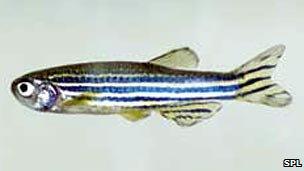Zebrafish may help motor neuron replacement
- Published

Edinburgh University has found a key hormone allows zebrafish to replace their motor neurons
A discovery made in fish could help research into motor neuron disease, according to Edinburgh scientists.
Edinburgh University has found a key hormone allows zebrafish to develop and replace their motor neurons, a nerve cell found in the spinal cord.
The discovery may help efforts to create neurons from stem cells in the lab.
In humans, motor neurons control important muscle activities such as speaking, walking and breathing.
When these cells stop working, it causes difficulties in motor functions and leads to paralysis and death.
While humans cannot replace motor neurons when they break down, zebrafish can, making them a good model for research.
Hedgehog pathway
The study, led by scientists at Edinburgh University's centre for neuroregeneration, is the first to show a signal released from the fish's brain, a hormone called dopamine, triggers the development and regeneration of cells in the spinal cord.
Dopamine acts on a mechanism, known as the hedgehog pathway, to increase the number of motor neurons formed in the developing spinal cord of zebrafish.
The dopamine signal was found to act in a similar way to replace damaged cells in adult zebrafish.
Dopamine was also found to drive the development of motor neurons in human embryonic stem cells, potentially paving the way for new and improved studies into motor neuron disease.
The work, published in the journal Developmental Cell, involved researchers from the Universities of Edinburgh, Cambridge, Helsinki and the Okazaki Institute for Integrative Biosciences, Japan.
Dr Catherina Becker, reader in neurobiology at Edinburgh University's centre for neuroregeneration, said: "Our work sheds light on the way in which motor neurons develop and re-generate, and could inform research that leads to an increased understanding of motor neuron disease and spinal cord injuries."
- Published18 April 2013
- Published17 August 2012
- Published1 February 2011